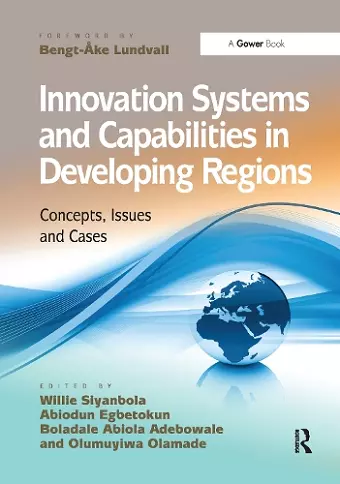Innovation Systems and Capabilities in Developing Regions
Concepts, Issues and Cases
Willie Siyanbola author Olumuyiwa Olamade author Abiodun Egbetokun editor
Format:Paperback
Publisher:Taylor & Francis Ltd
Published:22nd May '17
Currently unavailable, and unfortunately no date known when it will be back
This paperback is available in another edition too:
- Hardback£150.00(9781409423072)

In today's knowledge-driven world, innovation and innovation systems have become key policy issues. However, the extent of knowledge that is available on these concepts in less developed countries is still relatively low. Much of what we know about innovation theory and systems has come from the developed countries and reflects their world view. This apparent knowledge deficit has major implications for less developed countries. Innovation Systems and Capabilities in Developing Regions adds to the growing body of knowledge on developing countries. The theoretical and empirical case studies presented here advance the notion that, while developing countries may not engage in frontier research, a critical knowledge base upon which these countries compete for global markets is emerging. There is evidence that state and non-state actors are increasingly emphasising policies that sit within the framework of national innovation systems. This book illuminates this shift in policy competence at national levels. The contributions in this volume highlight the need for thorough understanding of the role of diffusion-based innovation linked to technology transfer and acquisition. They also provide empirical evidence on the drivers, dynamics and impact of such innovation in developing economies and the constraints that apply. Contributors also document the application of the innovation system approach in developing countries as well as the build-up and diffusion of technological capabilities within innovation systems. Academics, higher level students, policy makers and practitioners involved with innovation and the economics of technical change, particularly in developing countries, will find this a valuable book.
'Developing countries need a much deeper understanding of the process through which technology flows towards them, the way it is acquired and mastered, and its impacts in their domestic economies. They also need to rethink, redesign and upgrade their key science, technology and innovation institutions with a view to improve their effectiveness and efficiency, incorporating best practices from both developed and developing countries. This book goes a long way in this direction, and is edited by some of the most promising scholars from Nigeria. The book is highly recommended.' Jorge Niosi, University of Québec at Montreal, Canada 'Science, technology and engineering education and development are critical to transforming latecomer economies, often from primary commodity producing into knowledge based economies. For instance, the primary, mineral and agricultural based economy has proved to be a burden rather than a help to Africa. It is estimated that something like 268 billion dollars flows out of Africa, and hardly less than 30 billion comes to Africa. The economic structure that allows this gross outflow and inflow dynamics must be changed. It can be changed when works for capacity and competence building like this volume come out. I recommend highly this work that centres science, technology, engineering and innovation for economic development and transformation.' Mammo Muchie, SARChI Research Professor, IERI,Tshawne University of Technology, Pretoria, RSA
ISBN: 9781138115729
Dimensions: unknown
Weight: 453g
384 pages